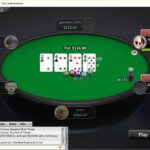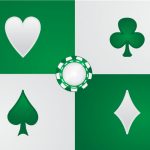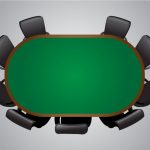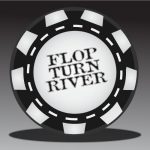Playing your table
A lot of poker players will tell you their most feared opponent is the loose aggressive guy who you can never really tell what he is raising with, and if you want to play with him, you are essentially gambling. Maybe this time he is bluffing with 10 7, instead of holding pocket Kings. If you’ve watched people like Daniel Negreanu, Gus Hansen, Ripptyde, myself, etc., you’ll notice something common. The table revolves around our play. Do an experiment… find a super tight table then go all in 4 or 5 times in an orbit, watch how the table behavior changes. Now the key is to be able to read table changes and capitalize. I don’t care if it’s mid tourney or the final table, 4 or 5 raises in an orbit will send some of the tightest players off kilter (or they will continue to fold to you, easily donating all their chips).
Granted, these types of players are generally seen busted near the beginning of most tourneys. I like to call this Controlled Chaos. You have to know when to fold’em. You get re-raised, cut your losses and get out. You get re-raised 2 more times, then they are onto you, and it’s time to switch gears. It’s also spotting weakness and opportunity. Will this guy crumble to a check raise? Cold call, cold call, river raise? Cold call, raise? Can I represent a strong hand to push him off his top pair? I often get asked many many times what I had. It really doesn’t matter what I have, it matters what he has, what he is going to bet, what he is going to call, what he is going to fold to.
This type of play style can open the door to a lot of creative play. Once you have the table acting the way you want it, you can capitalize. All of sudden your aces don’t get folded around to; someone with KQ thinks, “alright this punk has raised me out of my BB 5 times in the past 30 minutes” and pushes all in. Or an example from my $10 R&A, with about 14 people left. I had been purposefully leaning on the short stacks hard, throwing large raises to them. A guy just happened to be in between me and a short stack, and a few orbits earlier I pushed the short stack with A3o. He won on a turn King I think, and was still there. Then I get KK, same raise, and the guy in the middle (more chips then me by about 100k pushes all-in against my raise. He flips over 5’s. Two hands later I put him out of the tourney for the rest of his chips.
The most important factor in poker
The most important factor in poker is your mental and emotional state. Charts, odds, etc. can all be read and memorized, but what is going to set you apart from the field is your ability to handle the mental and emotional pressures of the game. You can’t see the impact it has on your game. I know what it is to take those; I took them for a month straight before I even got back ITM into a large tourney. It was a tough lesson in learning how to keep my emotions in check, keep myself mentally fit for the game, keep my eye on my prize (goal setting). One day after work, I said, “I’m going to go get my favorite dinner and win a tournament.” I completely detached myself emotionally and just played. My stats at the end were 2x more pots won then I saw flops, and $2700.
Bad beat stories get you nothing but negative EV for whatever you are doing after you rambled your story 5 times in 20 minutes, throughout 2 forums, chat rooms, and instant messages. It serves no purpose, and to any other poker player they have been there and done that. Try for a week to post your awesome lay downs, your great bluffs, and solid plays. I guarantee the quality of your play will rise, as will your confidence.
A saying I skinned onto my tables is “Confidence not overconfidence.” You can spend all the time you want beating your chest playing King Kong, but when you stop and look down, you’ll be missing chips, money, etc. Yes you are a good poker player, yes you can beat the field, yes you can win the whole thing, but not if you remove any of those elements, which you do by playing King Kong, or being overconfident. The greatest player in the world still loses when AK goes against his A7 with a flopped AK, no matter how much he wonders “How could they call my re-raise, I am the greatest!”
The key to everything in life, not just poker, is balance. If you can keep yourself on balance you will win, and we will see your name in lights. Practice being “on balance” this week.
Play to win
When I first started playing MTTs I played to place ITM. Placing ITM was the safe bet. It made me my money back plus a small bit and kept me alive, but rarely will you win just playing with the mindset to get ITM. From the second you hit the register button, it should be to “win.” If you play to win, you will play strong, and make all the moves to get you to the position to win. If you play to place, you will let all the people playing to win stomp on you. Then you will begin the “what-if” session.
You can place ITM 10 times, win a few bucks or you can take that 10 and win 1 for the big bucks. Did you really sit for 4 hours to take home an extra 10, 20, 100 bucks? I’d hope not. If you did you probably shouldn’t be playing ring or SNGs. Give yourself the opportunity to win and it will happen.
Playing the small stack
Your mindset as a small stack should be an animal backed into a corner. Yes, you are ferocious if provoked, but you are also calculating your way out of the corner. Short stack is a push or fold situation. You need to make someone make a decision for a chunk of their stack. If you are playing normal you will bleed off chips and eliminate yourself. You want to be playing hands where you have the potential for outs. See below.
Also you want to push into unraised pots. Generally the blinds will improve your stack nicely alone. You want to go for stealing the blinds, and not having to face a coin flip for your stack. If you get called, you get called.
The most important thing to keep in mind: NEVER QUIT.
3 people left in the $10 freezeout and I get smacked down to 50k in chips with huge blinds. Big blind lands on me and I fold my 102o. The crowd went crazy with “why fold?!” Small blind comes and I’m down to 11k left in chips after I post the SB, 97o. That’s the kind of hand I’m looking for, lot of potential out, slight dog to over, and can cover a lot of ground. I flopped a straight and went on to win the tournament being down to 11k left with 2.1mil in chips split between the other 2 players. What’s the difference? $1700! Never quit and just push because you got beat on a hand and are almost out anyway.
The Power, and weakness of calling
The weakness:
This post is actually inspired on an incorrect play that I made that knocked me out of a tournament, The way I played it could seem right, but I projected the wrong image on the hand, which inevitably cost me.
The hand:
Late position: AJ
The chip leader of the tourney raises 3xbb making it 12k (2k/4k blinds) UTG +2.
I call going to see my flop, the flop was rags and feeling like I went in with at least a slightly better hand I pushed my remaining stack to take it down right there (about 30k). He called me with a pair of 8’s and ended up hitting a 2-outer for trips vs. my pair of Jacks.
Another flip lost right? That’s what I initially thought until I came back to the hand this morning. I realized that the way I played the hand gave him an easy call. For starters, I simply called his 3xbb bet, instead of projecting strength and taking control of the hand. I let the hand remain neutral, appeared weak and was just playing for a flop. My push on the flop gave the projection that I just wanted to steal the big pot, but he had a middle pair and a stack. So he called because my preflop didn’t indicate strength, and I looked to be bluffing.
The Power:
Blinds are 2k/4k you have a 60k stack, are dealt 74 in the BB. It’s folded around to the guy who is 2 to your right who makes it 8k to go with a similar stack size. You make it 12k, he calls. Flop comes 10s 7h 2c. He leads out with 8k, you call. Turn is Jh. He checks, you bet 20k and he folds.
This type of hand will happen more often than you think.
He doubles your BB, but when re-raised only calls. Obviously he doesn’t have a strong hand, or is setting an elaborate trap. The flop comes giving you middle pair and a 10 high. He bets and you cold-call him. This raises a red flag to most people operating under the mindset (hey I’ll take a stab at the pot). So in caution he checks the turn, you bet large and he folds. Your call gave him the idea that you definitely have a hand, and more times than not he can’t beat that hand. Your average player will cut their loses right there and get out (thanks to all of the Hold’em books on the market).
—————————
I will be transitioning this post more into a Situational advice thread, if anyone has any specific situations they want commented on or discussed post them here and I will write something up.
The Check Raise Bluff
Well one of my favorite plays is a CR bluff. This play is great against loose and tight opponents alike, provided they understand the game. *Note: You can’t bluff a retard. Don’t try. It ends in frustration.
Example 1:
Blinds are 200/400 with a $25 ante. You are dealt 85o in late position and are sitting with 18k in chips. You raise to $1200 and the loose BB calls $800. Everyone else folds The flop comes 2 3 T. You know the BB will bet to your check. You check. The BB bets $1200. You raise to $4800. The BB folds.
Here you know the mannerisms of your opponent and that they understand the game. Unless they made a solid hand (2pair or a set) they will most likely fold. The idea here is knowing what your opponent will play. Chances are if he sees an ace he’s in, or any connectors, suited cards etc. Loose players don’t like getting check raised, or re-raised, but they will respect it if they understand the game.
If you get called at this point you need to do a full 180 and evaluate what would cause the guy to make the call. Has he been bleeding from chips chasing? Have you pulled bluff moves on him before? What type of hands have you been showing down since you sat at the table? Then combine all that into what hand would he make that play against ME with.
NEVER, ever just give up the hand once you get called. I can’t count how many chips I’ve taken on turn and river bets that people just couldn’t make. Yes he may have a 10, but on the turn when a jack falls, and a king on the river can he make a call for most of his stack with the pair of 10’s? Also if you get re-raised in this situation, respect it.
The Swings of Poker
Poker is crazy, it’s that simple. One day you are going to be riding on top of the world. You just beat out a large field of players and took down some serious cash, you are invincible, and your game can’t be beaten. You ride this wave of confidence, expanding into more games and making more money. Then one day you lose, and lose again, and again. Add a week worth of losses, another, and another. Finally you look down and realize, wow I just blew a couple of thousand dollars, and then you think what a couple of thousand dollars is. Your world comes crashing down, leaving you bare assed, heartbroken, and questioning. If this hasn’t happened to you, don’t worry, it will. Hopefully this post will at least keep you mindful of this.
You win and all you can see is $$, and how much potential you have to make some serious money. Your entire outlook on life changes. You realize that you just accomplished what very few people will ever accomplish. Then you win again. All of a sudden mentally you become a giant, stomping the competition, knowing you have what it takes to make some serious money, or for some of our desires, have what it takes to go pro. Then you lose again, except this time it’s 5 thousand dollars. You just lost your ass. Bad beats were a part of it, cold cards often, and some bad decisions on your part, playing over your head and out of your roll. Then this world you had set up and your mind crumbles, and all that seems real to you is grinding out that 9-5 job for the next 30 years.
Still want to play winning poker? Sounds pretty tough, doesn’t it? If you still want to play read on.
Poker is a mental game. The pros are pros for a reason, and it’s because they can handle themselves mentally. They can focus on the next win or the well-played hand, and forget about their bad beats. Test yourself when you think about playing poker. What’s the first hand you remember? Is it the time that you made the most amazing call, but was even more amazing because it was online? Or is it that stupid fish that played stupid, and won? If you can’t bring yourself mentally to accept that you will lose, and there will be times where you drop a lot of money, then you will never win.
I’ll use a friend as an example. He is one of the better players I know. His knowledge of the game is fantastic, and when he’s on I know he could sit with the best. However mentally he is wrecking himself, all his success and accomplishments are out the door when he loses. The actually loss of money destroys his entire game. He begins to play timid, scared, afraid, and loses more money. All of a sudden a pro caliber player is reduced to nothing. The reason being is that a few thousand is a lot of money to him as well as most of us. Three extra grand has a significant impact on life, and the sudden vanishing of that 3 grand is tough to deal with. You have to treat your poker money as an investment; you are investing in yourself as opposed to a business, a stock, a fund, etc. You need to treat it as such. And when you lose, hit something, laugh, but get back in there and win. Think about the time you nailed someone with an amazing bluff for a huge amount of chips. Get your head back in the game. That is when you will truly win at poker.
Building the early stack in a Tourney
I get a lot of people asking me how I consistently build a large stack during the initial stages of a tourney. First we must understand the dynamics of the tournament. You start with a tiny chip count with the knowledge that blinds tick up pretty quick. Most people hunker down and pick a spot for that one double up that gets them into the game. This is why you see 50% of the field drop in the first hour of the tournament. 95% of the field’s mindset is tight is right.
Now you need to look at the table dynamics. You can usually get a good feel for the entire table in an orbit or two. Make some quick mental notes. Most starting tables consist of a few bad players. These are the guys who get attached to hands like TPTK, draw with a KQ over card into bad odds and out of position, etc. A few average players. These guys are coming into their own, they understand the fundamentals, have left their calling station ways, and are ripe for the picking. You have a couple wannabes. There are the guys who you know are sitting with their sunglasses on, hoodies up in front of their computer and are all business. They will piss and moan the most, are capable players, but not great players. Then you have 1 or 2 good – great players at a table. Just keep an eye out. Some tables will have more or less of any of these types, but understanding the mindset of your opponent is the key to success.
The bad player, is nervous, excited, and is hitting the roof when an A with a high card is dealt to the hole. Typical Guidelines: Will bet if he has a hand, will call with any draw, will play most suited cards, middle pair is only slightly worse than top pair and they still have the chance for two pair. A bad beat is calling an all in with K10 when Q10 is on the board.
The average player will have done this a few times and are excited, but not too nervous (unless they are out of their bankroll). They know what a check raise is, they still overvalue TPTK and will generally bust on such a hand. They know how to bluff, but won’t do it till later and when they have chips. They slow play just about everything.
The “wannabes” are characterized by having watched too much TV and played too many home games, but not enough poker theory and study. These guys can rattle acronyms till your head hurts. They can make bluffs, often making too many of them, and they like to slow play. They like to over bet and overvalue their hands, are overly obsessive with chip count, but are bluff-able in the right situations, and if you “bluff” them twice they will call you. Sometimes these guys come in as King Kong and take an early exit.
The good- great players are chameleons. Their play will always be in contest with the table, maximizing their potential, playing tight, then loose, then maniac, then passive, etc. They will run bluffs, play their reads, understand position, stack, table dynamic, pot odds, hand odds, etc. These guys generally have a good idea of what it takes to get ITM. Some know what it takes to win.
I use all this information, and general guidelines to play a solid post flop game, which is where my stack really built. I will limp with a variety of hands. 47o, T8o, those small tiny 1 and 2 gapers, you name it. The goal of these hands is to either hit a great flop, or spot weakness in an opponent that can buy you a pot. My next tier hands get a 3xbb raise. These are hands like 10Jo and up. I raise to isolate and steal with a hand like this. Where I build my stack is all post flop play. Spotting weakness, knowing my opponent and if/how they can be pushed off of a hand. It’s not about risking your stack on that flip or slight advantage hand; it’s about continuously winning the small pots, and little hands.
If you are playing good poker you will win hands at the showdown. If you are playing great poker you will win hands without a showdown.
Good Poker, screw the cards!
Radashack’s MTT Tournament Advice Part 2
Click here to continue
reading Radashack’s MTT Tournament Advice Part 2.
Submit your review | |









